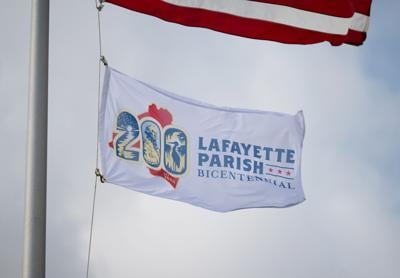In 1823, the Louisiana Legislature carved off the western half of St. Martin Parish to form a new parish.
They named it after the Marquis de Lafayette, the French general who was a hero to the Continental Army in the American Revolution.
The population of the new parish was settled along the bayous and other waterways in southwest Louisiana. They were farmers and trappers, traders and ranchers. Many were descendants of Acadians, a French ethnic group exiled from Canada by the British, many of whom ended up in Louisiana.
Today, Lafayette Parish — the state's fifth-smallest geographically — has a population of about 250,000 and is a bustling hub of business and services for much of southwest Louisiana.
A lot has happened in the past 200 years, and we're excited to launch a yearlong celebration of that history. Looking back at how we got here, our triumphs and mistakes we made along the way is important as we make decisions about what we want our next 200 years to look like.
And what better way to mark 200 years than with 200 short stories? As soon as we get Mardi Gras out of the way, you should start seeing these snippets about the people and places, moments and memories that have made Lafayette Parish the vibrant, diverse place it is today. They'll be in the newspaper, on our website and across our social media accounts.
But there are so many stories to tell.
That's why most Sundays starting in March, you'll find a more in-depth look focused on one characteristic of Lafayette Parish. Curious about Lafayette Parish Mardi Gras traditions? The role the Vermilion River has played in parish development? Or how Jewish, Lebanese, Laotian or Creole families have contributed to the parish? Those stories will be featured on Sundays.
But that is not all.
Four times over the year, we'll devote an entire section of the newspaper to a bigger topic such as business and industry or food and culture. These will be pull-out keepsake sections that will feature historic photos of Lafayette then and now.
We also want to hear your stories, in your own words. That's why we'll be setting up Lafayette bicentennial video storytelling stations at local festivals and other cultural events. Stop by and tell your story! In addition, we'll be looking for folks to participate in a video storytelling project that reflects the many diverse cultures that make up the fabric of Lafayette Parish.
This ambitious project relies on support from Lafayette Convention and Visitors Commission and Lafayette Consolidated Government, where folks have been working behind the scenes for months. They will keep you posted on upcoming bicentennial events at lafayette1823.org. Once published, stories and videos will also be available at theadvocate.com/acadiana.
And stay tuned for announcements of some fun events coming later in the spring.
This is going to be a collaborative effort — it's for the community and about the community, and it will only be successful with help from the community. So tell us what stories you think should be included. Any and all suggestions are welcome at [email protected].
Happy birthday, Lafayette Parish! We can't wait to tell your story!

